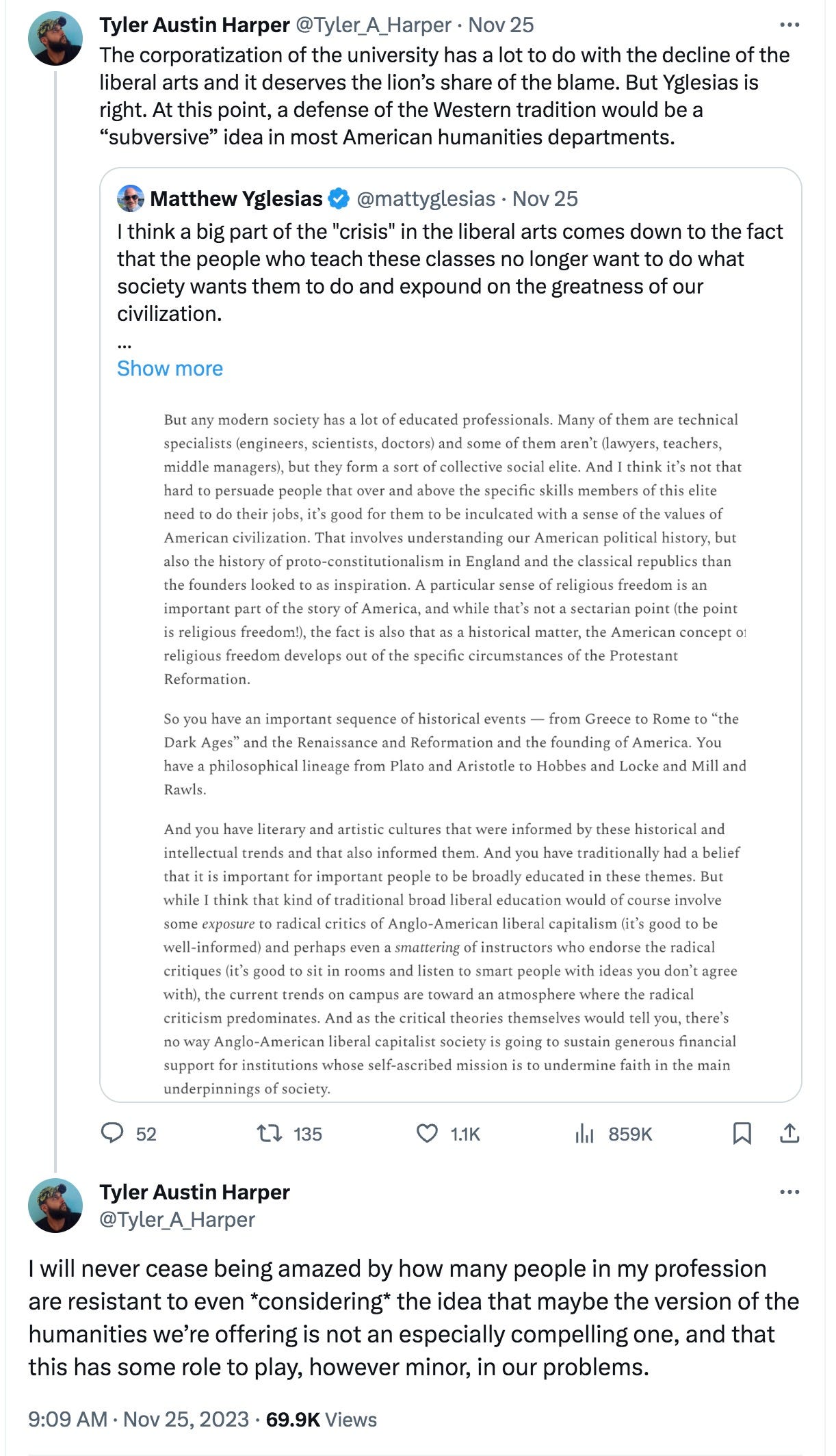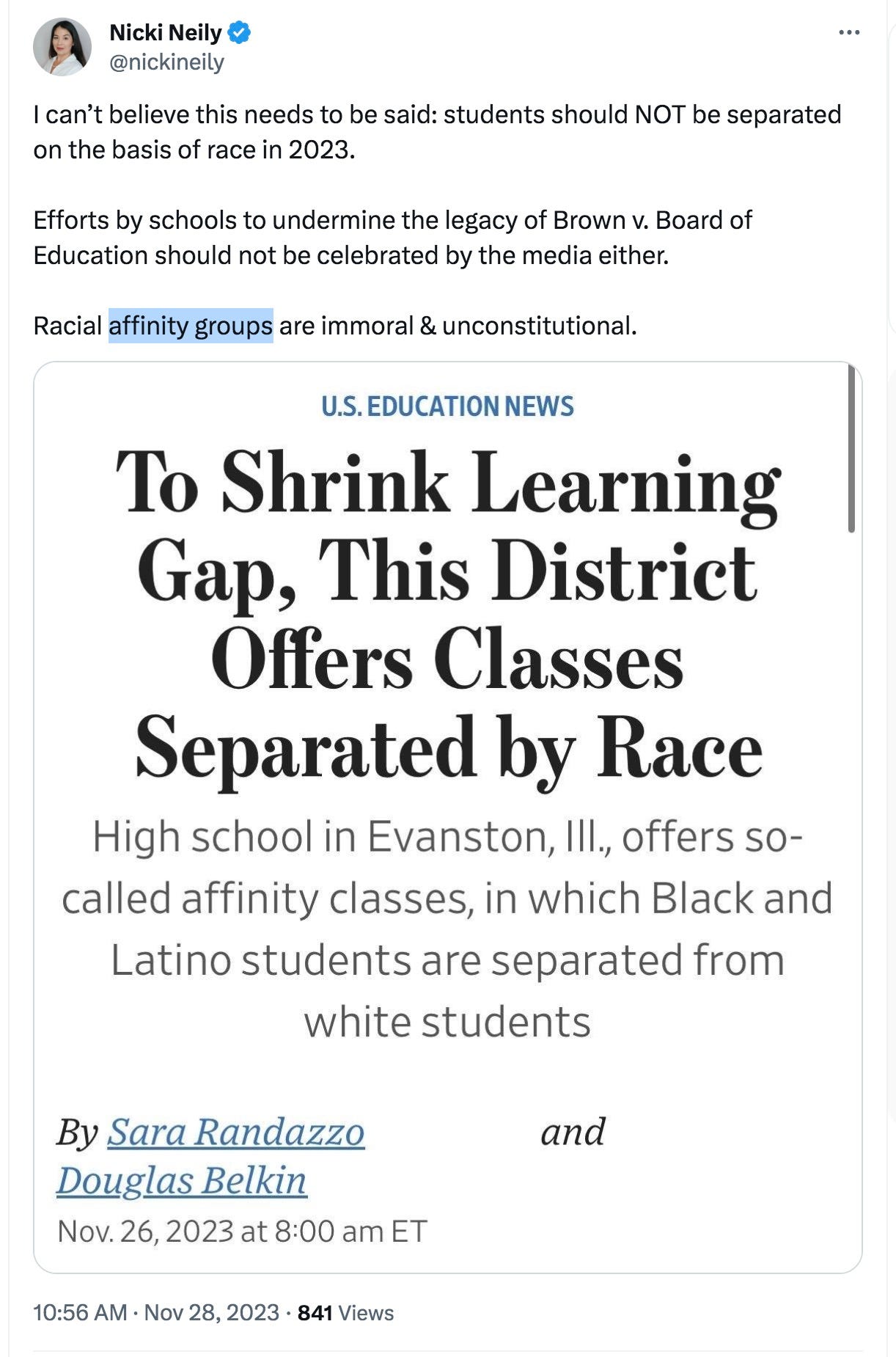E-Pluribus | November 28, 2023
We the People should stop blaming the Constitution for our problems; free speech hypocrites; and 'free speech' is not a get-out-of-jail-free card.
A round-up of the latest and best musings on the rise of illiberalism in the public discourse:
Jay Cost: Disregard for the Constitution? That’s on Us.
While the founders saw the Constitution as a way to preserve the republic, many today see it more as an impediment to progress. Writing at The Dispatch, Jay Cost says there are actually many reforms that can be made to our political system that don’t lay a glove on the Constitution.
The practical reality is that the Constitution is a very hard document to amend. . .
For good reason. Besides keeping it accessible for the people—a major concern of the framers—the Constitution privileges consensus. The animating idea behind its rules for government is that the larger, broader, and more durable majority, the more power it will should have to govern. The framers’ thinking was that such majorities are likely to operate in the interest of the whole community, rather than just a faction within it. Conversely, small, narrow, and fleeting majorities are less likely to have the public good in mind and will usually face gridlock. As the stakes for governance become higher, the supermajority requirements in the Constitution tend to increase, which is why it is so hard to change the document itself. Alterations to a community’s fundamental law should be approved by the vast majority of the community. Such majorities are rare, so the Constitution is rarely amended.
[. . .]
In fact, we often do not need to change the Constitution to effect the political outcome we desire. Many aspects of our system could be transformed without touching the Constitution. And as we consider what ails our body politic, it makes sense to prioritize the least drastic ways to cure it.
[. . .] For one, we could expand the House of Representatives.
Expanding the House of Representatives would actually make it more representative. That would be a good thing. The total number of House seats was capped at 435 over 100 years ago, and the typical House district now has more people in it than the largest state in 1787. To say that a single individual can meaningfully represent three-quarters of a million people—the average size of a House district—might work for the Senate, which is supposed to bypass swings in public opinion, but not for the House, which is supposed to be responsive to the people. A 435-member House is hardly stretching the bounds of practicality. After all, the British House of Commons and the German Bundestag both have more members than our House.
[. . .]
[T]here is no constitutional reason for winner-take-all presidential elections. In fact, in the early decades under the Constitution, many states allocated electors in some kind of proportional manner. Why not do that now?
[. . .]
Some may argue that the Senate has accrued too much power, especially through the courts. Again, a fair point. The courts wield vast power, and the Senate—by virtue of its authority to advise and consent on presidential nominations to them—serves as a major chokepoint on judicial authority. But in the original constitutional schema, the judiciary was far less powerful than it is today.
We have allowed the Supreme Court to grow its power by an order of magnitude over the last century, in ways that many of the framers, especially Madison, would downright detest. There is nothing in the Constitution that requires this. The Court has seized power in fits and starts, but ultimately the other branches have allowed it to do so. Perhaps retaking power from the courts, and returning it to the states or the political branches of the federal government, is a viable alternative. Maybe we need to reimagine the Court’s role in public life more as the framers did, giving it final say on individual cases and controversies, but expecting it to defer to the people on significant matters of community life. Once more, our problems are an “us” problem, not a “they” problem.
Read the whole thing.
Musa al-Gharbi: Free Speech Advocates Are Often Hypocrites. This Doesn't Make the Cause Less Important.
Do as I say, not as I do is something parents at times unintentionally communicate to children (and if we’re being honest, sometimes intentionally, too.) The same is often true of those advocating free speech who find it much easier to carve out exceptions for themselves. At Reason, Musa al-Gharbi concedes this is true, but that it doesn’t make the principles any less valid and vital.
Censorship has been getting more prevalent in the sciences, and it's driven heavily by scientists themselves. Those are the core findings in a new paper for the Proceedings of the National Academy of Sciences, led by behavioral scientist Cory Clark and co-authored by myself and colleagues from several disciplines. We found that the censorship—and self-censorship—is typically motivated by pro-social concerns, such as curbing misinformation or preventing harm to vulnerable populations.
Many on the left view concerns about free speech and viewpoint diversity as bad-faith attempts by privileged people to protect their privilege. According to this line of critique, straight white men were fine with exclusion and censorship until it started to affect people like themselves. Now that they find themselves on the receiving end of the stick, they're suddenly very righteous about open inquiry—at least insofar as it benefits them. Most still have little to say when leftists, anti-racists, queer scholars, and feminists find their freedoms under assault (as they regularly do). Conservatives who condemn DEI-based political litmus tests for hiring and promotion are often comfortable with Fox News witch-hunts against left-leaning professors or legislation that bans the teaching of views they dislike.
Let's grant that this happens. Many people are inconsistent in their support for open inquiry: They're not particularly concerned when views they oppose are censored but grow highly engaged when people and perspectives they support face suppression.
Even if people aren't concerned about a problem until it affects them, it's still a problem when they are, eventually, affected. The appropriate response to selective concern in one direction isn't selective concern in the other direction. That's a recipe for keeping anyone from enjoying a free atmosphere.
More broadly, it's an error to understand the interests of historically disadvantaged and historically dominant groups to be diametrically opposed. When people from historically privileged groups are facing censorship, that doesn't mean people in historically marginalized groups are actually being empowered.
Indeed, although censorial tendencies are frequently justified by the desire to protect vulnerable and underrepresented populations from offensive or hateful speech, speech restrictions generally end up enhancing the position of the already powerful at the expense of the genuinely marginalized and disadvantaged.
Read it all.
Ilya Shapiro: Where Free Speech Ends and Lawbreaking Begins
Around Twitter yesterday highlighted Ireland’s latest attempt to criminalize speech. Ilya Shapiro, writing for The Free Press, answers some common questions about where free speech ends and criminality begins (or at least where it should.)
Even antisemites have the right to free speech, as Nadine Strossen and Pamela Paresky correctly wrote in The Free Press. Since the Hamas massacre of October 7, they have been taking full advantage of that right. Especially on college campuses.
[. . .]
Those who care deeply about free speech are asking themselves many questions at this urgent moment: What should we make of the calls to punish Hamas apologists on campus? After all, this is America, where you have the right to say even the vilest things. Yes, many of the same students who on October 6 called for harsh punishment for “microaggressions” are now chanting for the elimination of the world’s only Jewish state. But Americans are entitled to be hypocrites.
Don’t these students have the same right to chant Hamas slogans as the neo-Nazis did to march in 1977 in Skokie, Illinois—a town then inhabited by many Holocaust survivors?
I would put my free speech bona fides up against anyone. I’m also a lawyer and sometime law professor who recognizes that not all speech-related questions can be resolved by invoking the words First Amendment.
Much of what we’ve witnessed on campuses over the past few weeks is not, in fact, speech, but conduct designed specifically to harass, intimidate, and terrorize Jews. Other examples involve disruptive speech that can properly be regulated by school rules. Opposing or taking action against such behavior in no way violates the core constitutional principle that the government can’t punish you for expressing your beliefs.
The question, as always, is where to draw the line, and who’s doing the line-drawing.
Read it all here.
Around Twitter (X)
The following is somewhat of a departure from the norm for our Around Twitter feature, but this thread serves as a good update on Pluribus’s coverage of the media responses to October’s al-Ahli Hospital explosion in Gaza:
Here’s Bates College assistant professor Tyler Harper on the redheaded stepchild status of Western traditions at most institutions of higher learning:
And finally, move over, separate-but-equal—it’s time for… racial affinity groups!









